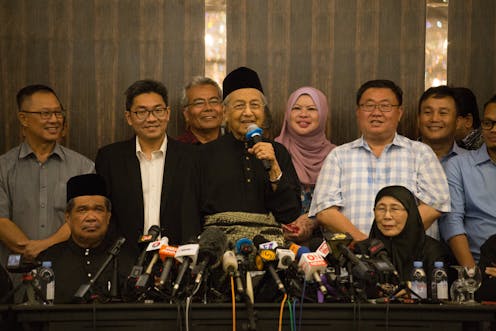Malaysians celebrate the return of Mahathir and hope for a brighter future
- Written by James Chin, Director, Asia Institute Tasmania, University of Tasmania

When Malaysians woke up on May 10, the world looked and felt different. For the first time in years, many Malaysians feel a sense of optimism that was missing in their lives. For the past six decades, Malaysians have been living under the rule of the United Malays National Organisation (UMNO).
UMNO had won every election since 1955. In the May 9 general elections, Najib Razak, UMNO’s leader and prime minister, was not only confident, he was telling close aides that he was aiming for two-thirds of the seats in the 222-seat parliament. By the time the final vote was counted, UMNO had only 79 seats and lost power.
Read more: Mahathir Mohamad crops up again in bid to lead Malaysia – with Anwar on the same side
What happened? This will be the question preoccupying political scientists for years to come.
Suffice to say, Najib lost due to three main reasons.
First, his personal brand had become synonymous with kleptocracy. He was alleged to have received close to US$1 billion from a Malaysian sovereign fund via complex international transactions. It did not help that Najib’s wife, Rosman Mansor, was widely regarded as a spendthrift with a passion for diamonds and designer bags.
Second, Dr Mahathir Mohamad was no ordinary opponent. Mahathir was Malaysia’s longest-serving prime minister, from 1981 to 2003, and had come out of retirement to fight Najib.
Third, and perhaps most important, UMNO was simply seen as an organisation for political patronage, and a purveyor of racism and crony capitalism. It was no longer seen as a Malay nationalist party. In the past few decades, UMNO has been regarded as vehicle for making big money, government corruption and spreading hate towards the Chinese community in Malaysia.
The rural Malays, the mainstay of UMNO political power, could not stomach Najib’s toxic reputation as “Mr Kleptocrat”. They could see that under continued UMNO rule, their lives would be economically ruined. The GST brought in by the Najib administration was the last straw. Prices of basic necessities went up across the board despite Najib’s insistence that the GST would bring down prices.
There is tremendous goodwill towards Mahathir. Yes, he was dictatorial when he was prime minister the first time around. But most Malaysians I spoke to say this time it will be different. Mahathir is 92, and it is obvious he is a transitional leader.
He has said many times that once his jailed former deputy, Anwar Ibrahim, can get a royal pardon and a seat in parliament, he will hand over power to Anwar. Many Malaysians believe he will keep his word: after all, he cannot be going for re-election when he is 98.
Mahathir will also be constrained by the opposition’s organisational structure. His party, Pribumi Bersatu, is the third-smallest of the four parties in Pakatan Harapan (PH) (Alliance of Hope). He is not in a position to bully.
Finally, what will happen to Najib Razak? Will he go to jail for 1MDB and the missing billions? In the short term, the answer is “no”. The new government will not immediately arrest Najib, or his wife. It will instead likely establish a committee to look into the 1MDB affair and get a definitive answer as to where the US$5billion disappeared to.
Read more: Centre Alliance's Rebekha Sharkie most vulnerable at byelections forced by dual citizenship saga
If the investigation panel shows Najib is behind the scam, then, yes, Najib will probably end up in jail. But this is a long process. It is more likely that any prosecution against Najib will start outside Malaysia.
Several governments, notably the US, are interested in sorting out the 1MBD issue. Thus far they could not complete their investigations because Najib used his position to stop Malaysian institutions from cooperating with the US Department of Justice probe into 1MDB.
There is a potential new angle to 1MDB, which is related to Australia. The bank account Najib used to launder 1MDB’s money is actually part-owned by ANZ Australia. Many believe some of the money from 1MDB passed through the Australian financial system.
Authors: James Chin, Director, Asia Institute Tasmania, University of Tasmania




